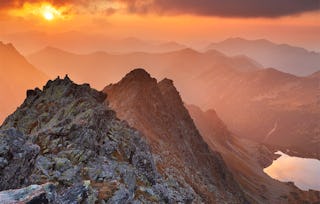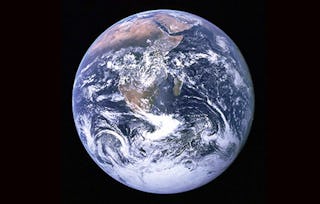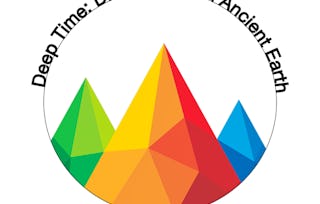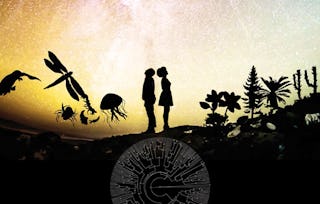Tremblements de terre, volcans, formation de montagnes, périodes glaciaires, glissements de terrain, inondations, évolution de la vie, mouvement des plaques : tous ces phénomènes ont interagi au cours des vastes étendues de temps profond pour sculpter la planète dynamique sur laquelle nous vivons aujourd'hui. Planète Terre présente une vue d'ensemble de plusieurs aspects de notre maison, d'un point de vue géologique. Nous commencerons par les tremblements de terre - ce qu'ils sont, ce qui les provoque, leurs effets et ce que nous pouvons faire à leur sujet. Nous soulignerons que la tectonique des plaques - la grande théorie unificatrice de la géologie - explique comment la carte de la surface de notre planète a radicalement changé au cours des temps géologiques, et pourquoi l'activité géologique actuelle - y compris une variété de catastrophes naturelles dévastatrices telles que les tremblements de terre - se produit là où elle se produit. Nous étudierons les volcans, les types d'éruptions et les roches typiques que l'on y trouve. Enfin, nous nous pencherons sur les processus qui produisent l'énergie et les ressources minérales dont dépend la société moderne, afin de mieux comprendre le contexte de l'environnement et les défis en matière de développement durable auxquels nous serons confrontés à l'avenir.

La planète Terre...et vous !

535 avis
Compétences que vous acquerrez
- Catégorie : Pétrole et gaz
- Catégorie : Énergie et services publics
- Catégorie : Systèmes d'information géographique
- Catégorie : Systèmes durables
- Catégorie : Analyse des risques
- Catégorie : Sciences physiques
- Catégorie : Vibrations
- Catégorie : Science de l'environnement
- Catégorie : Environnement
- Catégorie : Information et technologie géospatiales
- Section Compétences masquée. Affichage de 9 compétence(s) sur 10.
Détails à connaître

Ajouter à votre profil LinkedIn
16 devoirs
Découvrez comment les employés des entreprises prestigieuses maîtrisent des compétences recherchées

Il y a 6 modules dans ce cours
Vous vous familiariserez avec le cours, vos camarades de classe et notre environnement d'apprentissage. L'orientation vous aidera également à acquérir les compétences techniques requises pour le cours.
Inclus
8 lectures1 devoir1 plugin
Dans les exposés de cette semaine, nous verrons ce qu'est un tremblement de terre, comment il se produit, comment nous pouvons enregistrer et mesurer sa taille, et ce que nous pouvons faire pour atténuer les dégâts. Notre premier travail hebdomadaire consiste à rapporter votre propre expérience des tremblements de terre (s'il y en a eu). Le laboratoire de la semaine 1 vous donne l'occasion de travailler avec des sismogrammes, de localiser l'épicentre d'un tremblement de terre et d'en déterminer la magnitude. Enfin, la discussion de la semaine 1 porte sur l'équilibre entre les risques liés aux tremblements de terre et les coûts des mesures préventives.
Inclus
18 vidéos1 lecture3 devoirs1 sujet de discussion
Au début du XXe siècle, la publication de l'hypothèse de la dérive des continents a provoqué un tollé qui s'est vite estompé. Les données recueillies au milieu du siècle ont amené les géologues à reconsidérer l'idée que les continents pouvaient se déplacer. Au cours des années 1960 et 1970, les anciennes idées ont été remaniées pour aboutir à ce que l'on appelle aujourd'hui la théorie de la tectonique des plaques. Comme nous le verrons, cette théorie robuste englobe de nombreux phénomènes géologiques qui, à première vue, n'ont aucun rapport entre eux : tremblements de terre et volcans, mais aussi périodes glaciaires, fossiles et montagnes. Aujourd'hui, la tectonique des plaques constitue un cadre général d'interprétation de la Terre. Nous en étudierons les détails au cours de la semaine 2, mais nous reviendrons sans cesse sur cette théorie tout au long de ce cours.
Inclus
17 vidéos1 lecture3 devoirs1 évaluation par les pairs1 sujet de discussion
Cette semaine, vous apprendrez comment et où les roches peuvent fondre, et ce qui se passe lorsque des matériaux en fusion de différentes compositions jaillissent du sol. Les vidéos de l'exposé traitent également des différents types d'éruptions, ainsi que des roches et des montagnes qui en résultent. Dans le laboratoire, vous étudierez les détails de l'éruption du mont Saint Helens en 1980 et de l'éruption du mont Vésuve en l'an 79. Le forum de discussion vous donne l'occasion d'évaluer les risques encourus par les personnes vivant sur ou à proximité des volcans et ce qui peut être fait pour minimiser les dommages et les pertes humaines. Le devoir hebdomadaire vous permet de partager vos propres expériences avec les volcans ou les éruptions ou, si vous n'avez jamais été à proximité d'un volcan, vos réflexions sur de tels événements.
Inclus
23 vidéos1 lecture3 devoirs1 sujet de discussion
Dans le cadre de l'exercice de la semaine 4, vous observerez attentivement votre environnement quotidien afin d'identifier les ressources terrestres. Les conférences vidéo de la semaine examinent divers aspects de la recherche, de l'extraction et de l'utilisation de ressources telles que les métaux et les pierres. Pour le laboratoire, vous utiliserez Google Earth pour examiner plusieurs sites miniers dans le monde. Lors de la discussion, vous pèserez le pour et le contre des opérations minières, comme l'ont déjà fait de nombreuses communautés. Cette semaine comprend également des discussions notées par les pairs, comme expliqué sur la page Comment fonctionnent les discussions notées. Enfin, nous proposons un exercice facultatif à ceux qui souhaitent identifier des minéraux courants.
Inclus
19 vidéos1 lecture3 devoirs1 évaluation par les pairs1 sujet de discussion
Les conférences vidéo de cette semaine couvrent divers aspects de l'utilisation de l'énergie par la civilisation moderne, en particulier l'utilisation des combustibles fossiles. Le laboratoire de la semaine 5 vous emmène sur Google Earth visiter des sites de production d'énergie dans le monde entier, des lieux où sont produites des formes d'énergie conventionnelles et alternatives. Le devoir de la semaine 5 vous donne l'occasion de faire le point sur votre utilisation personnelle de l'énergie - d'où vient-elle et combien en consommez-vous - et de partager ensuite ces informations avec les autres membres de la classe. Au cours de la discussion de la semaine 5, vous examinerez les implications de la façon dont la société utilise l'énergie des combustibles fossiles et les conséquences pour l'environnement local et le climat mondial.
Inclus
18 vidéos1 lecture3 devoirs1 sujet de discussion1 plugin
Instructeurs


Offert par
En savoir plus sur Sciences de l'environnement et durabilité
 Statut : Prévisualisation
Statut : PrévisualisationAmerican Museum of Natural History
 Statut : Prévisualisation
Statut : PrévisualisationUniversity of Manchester
 Statut : Prévisualisation
Statut : PrévisualisationUniversity of Colorado Boulder
 Statut : Gratuit
Statut : GratuitUniversity of Cape Town
Pour quelles raisons les étudiants sur Coursera nous choisissent-ils pour leur carrière ?

Felipe M.

Jennifer J.

Larry W.

Chaitanya A.
Avis des étudiants
- 5 stars
88,43 %
- 4 stars
10,26 %
- 3 stars
0,55 %
- 2 stars
0,55 %
- 1 star
0,18 %
Affichage de 3 sur 535
Révisé le 10 sept. 2017
This is the second time that I took this course. It was more in depth in topics than the original course, and I enjoyed it. Good presentation. Thank you.
Révisé le 1 oct. 2020
Lesson content, especially the video lectures, is accessible and also adds on more to what I already learned about the geology.
Révisé le 22 mai 2020
The professors make learning fun and fruitful. This course is interesting and provides great insights into Mother Nature and why we should protect the one and only home we have.

Ouvrez de nouvelles portes avec Coursera Plus
Accès illimité à 10,000+ cours de niveau international, projets pratiques et programmes de certification prêts à l'emploi - tous inclus dans votre abonnement.
Faites progresser votre carrière avec un diplôme en ligne
Obtenez un diplôme auprès d’universités de renommée mondiale - 100 % en ligne
Rejoignez plus de 3 400 entreprises mondiales qui ont choisi Coursera pour les affaires
Améliorez les compétences de vos employés pour exceller dans l’économie numérique
Foire Aux Questions
Pour accéder aux supports de cours, aux devoirs et pour obtenir un certificat, vous devez acheter l'expérience de certificat lorsque vous vous inscrivez à un cours. Vous pouvez essayer un essai gratuit ou demander une aide financière. Le cours peut proposer l'option "Cours complet, pas de certificat". Cette option vous permet de consulter tous les supports de cours, de soumettre les évaluations requises et d'obtenir une note finale. Cela signifie également que vous ne pourrez pas acheter un certificat d'expérience.
Lorsque vous achetez un certificat, vous avez accès à tous les supports de cours, y compris les devoirs notés. Une fois le cours terminé, votre certificat électronique sera ajouté à votre page de réalisations - à partir de là, vous pouvez imprimer votre certificat ou l'ajouter à votre profil LinkedIn.
Oui, pour certains programmes de formation, vous pouvez demander une aide financière ou une bourse si vous n'avez pas les moyens de payer les frais d'inscription. Si une aide financière ou une bourse est disponible pour votre programme de formation, vous trouverez un lien de demande sur la page de description.
Plus de questions
Aide financière disponible,

